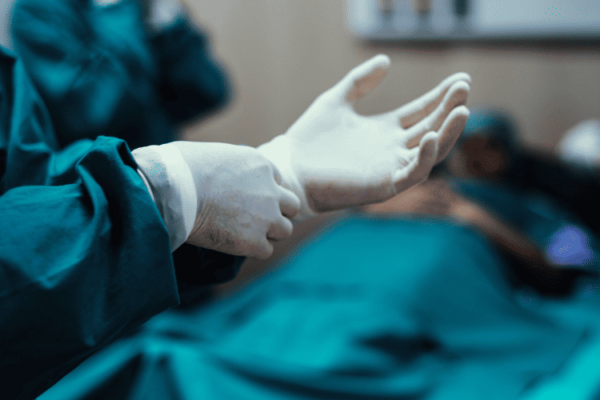
02 Sep Stomach Cancer: Symptoms & Risk Factors
Stomach Cancer: Symptoms & Risk Factors
By Island Hospital | Sep 2, 2021 5:43:25 PM
As with all cancers, the key to the patient’s chance of full recovery is early detection and prompt medical treatment. Stomach cancer represents a challenge in that there are usually no symptoms in the early stages. Sometimes, the symptoms when they appear, can be mistaken for other ailments, such as a viral infection or an ulcer. Learn more about stomach cancer, its symptoms and whether you are at risk of developing the disease.
Stomach cancer is characterised by a growth of malignant cells within the lining of the stomach. Likewise called gastric cancer, this type of cancer is hard to detect because most people generally do not show symptoms in the earlier stages.
While stomach cancer is fairly rare compared to other kinds of cancer, one of the most significant threats of this disease is the difficulty of diagnosing it.
As stomach cancer does not usually trigger any early signs and symptoms, it usually goes undiagnosed until after it has spread to other organs in the body. This makes it harder to treat.
Your stomach together with the esophagus is just one part of the upper section of your digestive system. Your stomach digests food and then moves the nutrients along to the rest of your digestive organs, specifically the small and large intestines.
Cancer starts when cells in the body begin to grow out of control. This can happen in almost any part of the body. Cancerous cells can then spread to other areas of the body.
Similarly, stomach cancer occurs when normally healthy cells within the upper digestive system become malignant and grow out of control, forming a tumour. Stomach cancer grows slowly and tends to develop over many years.
Some of the risk factors that might increase your chance of developing stomach cancer include:
- Tumours in other parts of the digestive system.
- H. pylori infections (a type of stomach infection that can sometimes lead to ulcers).
- Stomach polyps (unusual tissue growths that form on the stomach lining).
- Lymphoma (a group of blood cancers).
Stomach cancer is also more common among:
- Older adults, usually individuals 50 years and above.
- Men.
- Smokers.
- Individuals with a family history of the disease.
- People of Asian (especially Korea or Japanese), South American, or Belarusian descent.
While your medical history can affect your risk of developing stomach cancer, your choice of lifestyle can also be a contributing factor. You might be more likely to get stomach cancer if you:
- Have a history of alcohol abuse.
- Consume too much red meat.
- Eat too much salty or processed foods.
- Do not store or cook food properly.
- Lead a sedentary lifestyle with little or no exercise.
You may consider getting a screening test if you think that you’re a risk for developing stomach cancer. Screening tests are carried out when people are at risk for certain diseases but do not show symptoms yet.
What are the early signs of stomach/gastric cancer? In truth, there are rarely any early indications as stomach cancers often tend to develop slowly over many years.
Before a true cancer develops, pre-cancerous changes often happen in the inner lining of the stomach. These early changes rarely trigger symptoms, so they usually go undetected. In countries like Malaysia where screening for stomach cancer is not routine, most stomach cancers aren’t discovered until they reached an advanced stage.
When stomach cancer does cause signs and symptoms, they can include:
- Pain or feeling of discomfort in the abdomen.
- Feeling full after eating just a small meal.
- Poor appetite.
- Heartburn or acid indigestion.
- Nausea or vomiting.
- Throwing up, with or without blood.
- Weight loss.
- Constant bloating.
- Fluid accumulation in the abdomen.
- Bloody feceses.
- Excessive fatigue.
- Jaundice (if the cancer has spread to the liver).
Most of these symptoms could be caused by other ailments apart from stomach cancer, such as a viral infection or an ulcer. However, if you have any of these issues, particularly if they do not go away or get worse, you should see a doctor so that the cause can be found and dealt with, if required.
At Island Hospital in Penang, Malaysia, you may consult any of our specialist doctors for stomach cancer here
To make a diagnosis, your doctor will first carry out a physical exam examination to look for any abnormalities. They may also order a blood test including a test for the existence of H. pylori bacteria.
In particular, the doctor will feel your stomach for anything abnormal. Your medical history and your symptoms (such as digestion problems, pain, bloating, etc.) and also possible risk factors are also taken into consideration.
The doctor might order a blood test to search for anemia (low red blood cell count), which could be caused by the cancer bleeding into the stomach. A test might also be done to look for blood in your feces, which could also be a sign of bleeding in the stomach.
If stomach cancer is suspected, you will likely be referred to a gastroenterologist.
Diagnostic tests specifically look for suspected tumours and other abnormalities in the stomach and esophagus. These tests may include:
- an upper gastrointestinal endoscopy
- a biopsy
- imaging tests, such as X-rays and CT scans
Stomach cancer is treated with one or more of the following:
- chemotherapy
- radiation
- surgery
- immunotherapy, such as vaccines and medication
Your specific treatment strategy will depend on the origin and stage of the cancer. Age and overall health can also play a role.
Apart from treating cancer cells in the stomach, the objective of treatment is to prevent the cells from spreading. Stomach cancer, when left untreated, may spread to the:
- lungs
- lymph nodes
- bones
- liver
There is no guarantee that you can stop stomach cancer from occurring. As with all cancers, you can reduce your risk of getting them by:
- Maintaining a healthy weight
- Eating a balanced, low-fat diet
- Giving up smoking
- Exercising regularly
In some cases, doctors may also prescribe medications that can help reduce the risk of stomach cancer. This is usually done for people that have other diseases that are known to contribute to the cancer.
Early detection is the key to surviving stomach cancer. Consider getting an early screening test that can be helpful in detecting stomach cancer.
At Island Hospital in Penang, Malaysia, you may consult any of our gastroenterologists for consultation on getting a stomach cancer screening test.





![[IH 2025] #33 ECG Test_Image 1 medical-machine-ecg-test](https://islandhospital.com/wp-content/uploads/2025/07/IH-2025-33-ECG-Test_Image-1-600x400.png)

